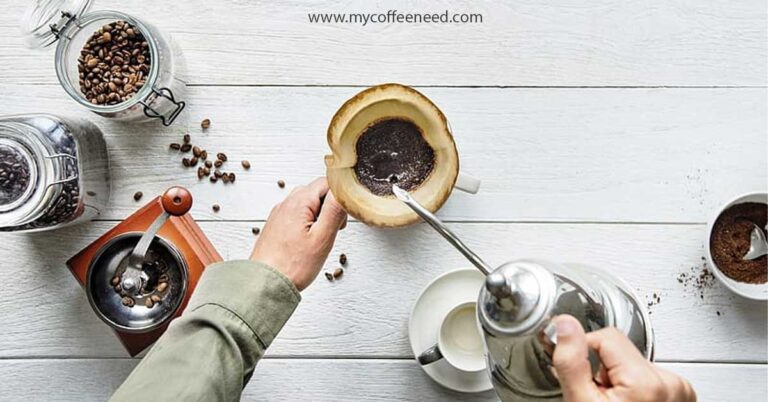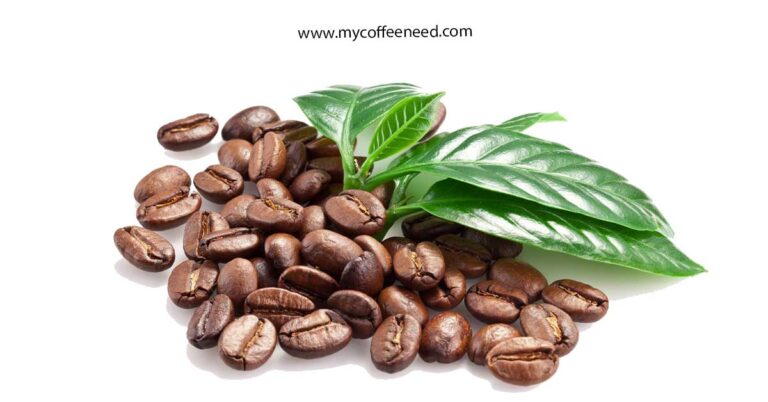Chai Tea vs Coffee
Are you a coffee lover who’s looking to mix things up? Or perhaps you’re an avid tea drinker who wants something more robust? The pour over method of brewing is the perfect way to make either chai or coffee with unparalleled flavor and richness. Let’s take a look at what it takes to make a perfect pour over cup of either chai tea vs coffee.
Water Temperature and Grind
The first step to making either chai tea or coffee is selecting the right grind size for your beans. For coffee, you want a medium-fine grind that will allow for maximum extraction.
Chai, on the other hand, needs a finer grind so that all of the flavors can be extracted. Once you have your grind size, you’ll want to make sure you’re using water at the proper temperature – for coffee, it should be around 195-205°F and for chai tea, somewhere between 175-185°F.
Beans and Equipment
When it comes to the beans, you’ll want to use high-quality Arabica beans for your coffee. For chai tea, look for a blend of spices including cardamom, ginger, black pepper, cloves, nutmeg, and cinnamon. You’ll also need some special equipment like a pour over cone or carafe and a gooseneck kettle for accurate pouring.
Brewing the Perfect Cup
Once you have all your ingredients and equipment ready, it’s time to start brewing. Begin by preheating your carafe or cone with hot water. Then measure out your beans – for one cup of coffee, use 21-24 grams – and grind them freshly.
Place the grounds in the preheated carafe and slowly begin to pour your hot water over them. If you’re making chai, add a few teaspoons of your spice blend at this point as well.
Continue pouring until you reach your desired cup size – usually around 8 ounces for coffee and 12 ounces for chai tea.
Keep an eye on the time it takes to pour – you want to aim for a brew time of 2-4 minutes for coffee and 4-6 minutes for chai tea. Once you’ve reached the desired cup size, discard the grounds and enjoy your perfectly brewed cup!
Chai Tea vs Coffee
So which one should you choose – chai tea or coffee? Both options offer an exceptionally flavorful experience and it really comes down to personal preference.
For the ultimate coffee flavor, try using a light-medium roast and if you’re looking for something with more sweet spice notes, go for chai tea. Whichever you choose, the pour over method ensures that every cup is made perfectly!
You don’t have to just stick with either chai tea or coffee – you can also combine the two for a unique flavor experience.
Start by making a pour over of your favorite chai blend and then top it off with some freshly brewed espresso for a complex depth of flavor that’s truly unparalleled.
More than Just a Drink
Chai tea and coffee are more than just beverages; they take on roles as cultural symbols, embodying the essence of hospitality, tradition, and community.
Particularly, chai tea holds a deep significance in the Indian society. This brew is not just a drink, but a symbol of hospitality and a social staple in the subcontinent.
In India, offering chai tea to guests is seen as a gesture of warm welcome, and it’s a ubiquitous presence in every social gathering. It’s not uncommon to see people sipping chai at roadside tea stalls, discussing everything from politics to cricket.
The act of preparing and consuming chai bridges social gaps, fosters friendly conversation, and surprisingly, even resolves conflicts.
The intricate process of brewing chai, the mix of aromatic spices, and the taste that satiates the soul, all make chai much more than just a hot beverage. It’s a link to Indian heritage, an age-old tradition, and an enduring symbol of Indian hospitality.
Is chai tea as strong as coffee?
The answer to this question largely depends on how you prepare each beverage. Both chai tea and coffee can be made with a range of ingredients and brewed at various strengths.
Generally speaking, coffee tends to contain more caffeine than chai tea because it is brewed directly from the roasted beans while chai is usually made with black tea leaves blended with spices like ginger, cardamom, and cinnamon.
Still, you can make a strong cup of chai tea by brewing the leaves for longer or using more spices. Alternatively, if you’re looking for a milder cup of coffee, you can opt for lighter roasts – like American or Vienna – as these tend to be lower in caffeine than darker roasts.
What’s the Difference Between Chai Tea Caffeine and Coffee Caffeine?
When it comes to caffeine levels, chai tea and coffee offer two very different experiences. Coffee contains much more caffeine than chai – a single cup of coffee can range from 60-180 mg of caffeine, while the same size cup of chai tea will usually contain only around 30-50 mg.
That makes chai tea a great option for those who don’t want too much caffeine but still want to enjoy a flavorful cup. Plus, the added spices in chai tea balance out the effects of the caffeine, so you can avoid any potential jitters.
But whatever your caffeine preferences are, the pour over method is sure to deliver a delicious cup of either chai tea or coffee that’s sure to please.
With the right grind size, water temperature and beans or spices, you can make a perfectly balanced cup every time! So grab your equipment and give it a try – you won’t be disappointed.
Are you ready to experience pour over brewing? Chai tea vs coffee – which one will you choose? Get brewing and find out for yourself.
The Origins of Chai Tea and Coffee
It’s interesting to note that both chai tea and coffee have long and rich histories. Coffee was first discovered in Ethiopia, where the locals would roast and grind up coffee beans and mix them with animal fat for a unique energy-boosting snack.
Chai tea also has its roots in India, where it was first brewed using spices like ginger, cardamom, and cinnamon. Both beverages have since evolved to become staples in cultures around the world, enjoyed for their unique flavor profiles and energizing effects.
No matter which you choose, the pour over method of brewing chai tea or coffee is the perfect way to bring out maximum flavor and complexity in each cup.
Whether you’re looking for a smooth cup of perfectly brewed coffee or an aromatic cup of chai tea, try a pour over brew today and enjoy the perfect flavor experience.
The Cultural Significance of Chai Tea and Coffee
Chai tea and coffee are not just beverages; they are an integral part of the cultural fabric in many societies. In India, for instance, chai is much more than just a cup of tea.
It symbolizes hospitality and is a vital element at every social gathering. Chai assumes an essential role in daily life, with the tradition of chai-making varying across different regions, each adding its unique touch to the concoction.
Similarly, coffee holds deep cultural significance. Its roots trace back to Ethiopia, where coffee remains central to social and traditional rituals. In modern Western societies, coffee fuels workplaces and serves as an impetus for social meetups.
It has even cultivated its own culture defined by specialized brewing techniques and a proliferation of artisanal coffeehouses.
Whether it’s chai tea or coffee, these beverages symbolize more than just a refreshing break; they represent a rich tapestry of cultural traditions and social rituals.
Nutritional and Health Benefits
When it comes to health benefits, both chai tea and coffee have a treasure trove to offer. For the health-conscious coffee lover, the beverage is known to increase alertness, help burn fat by boosting metabolic rate, and potentially lower the risk of certain types of diseases, such as Alzheimer’s and Parkinson’s.
Chai tea, on the other hand, is a powerhouse of antioxidants, thanks to its blend of spices like ginger, cinnamon, and cardamom.
Not only does it offer a delightful mix of flavors but it is also beneficial to health in a variety of ways. It aids digestion, boosts the immune system, and may even help balance blood sugar levels.
The spices in chai have been linked to anti-inflammatory and anticancer properties, offering a delicious and healthful way to stay hydrated.
Both beverages, when consumed in moderation and sans excessive sugar or additives, can be part of a balanced diet. So whether you’re reaching for a cup of freshly brewed coffee or a warm, comforting chai, you’re also investing in your health.
Social and Cultural Implications
Lastly, delving into the social and cultural implications of chai tea and coffee is an intriguing journey. Chai, with its rich intensity and spicy warmth, is more than just a beverage; it’s a catalyst for conversation and connection.
The drink, meant to be savored slowly, ideally surrounded by good company, evokes a sense of comfort and camaraderie.
The act of preparing chai is almost ritualistic, with each step meticulously carried out – from brewing the tea to adding the spices – further emphasizing its role in fostering community and togetherness.
On the other hand, coffee too has its own social implications. Think about the common phrase “Let’s grab a coffee”; it’s a universal invitation to sit down and catch up.
Countless business meetings, friendly chats, and even romantic connections have taken place over cups of coffee. The act of sipping coffee while engaging in conversation has become a culturally accepted norm in many societies.
Whether it’s the traditional Ethiopian coffee ceremony or the modern coffee shop hangout, the social impact of coffee is undeniable.
What’s in Your Cup?
Do you ever stop to think about what’s actually in your cup when you’re savoring that delicious sip of chai tea or coffee? Well, it’s time to appreciate not just the taste, but also the health benefits these beverages bring.
Let’s start with chai tea, a delightful blend of tea leaves and aromatic spices like ginger, cardamom, and cinnamon. These ingredients are not just flavor enhancers; they’re packed with antioxidants that fight inflammation and protect your cells from damage.
Ginger and cinnamon, in particular, can improve digestion and even help balance blood sugar levels. So while you’re enjoying your warming cup of chai, remember that it’s doing your body good too!
As for coffee, there’s a lot more in your cup than just a wake-up call. Yes, coffee is known for its caffeine content that can boost mental alertness, but that’s only the beginning.
The humble coffee bean is rich in antioxidants, which can protect your body from oxidative stress and inflammation.
Furthermore, regular consumption of coffee has been linked to a reduced risk of certain diseases. Studies have found potential protective effects against Alzheimer’s and Parkinson’s diseases. So, the next time you indulge in a cup of coffee, remember, it could be a small step towards better health.
Brewing Connections
Have you ever stopped to consider the social implications of your beverage choices? They are, after all, so much more than just thirst quenchers or pick-me-ups. Take chai tea, for instance.
This aromatic blend invites conversation and connection, serving as a warm, comforting bridge between individuals. Its rich flavor and soothing warmth make it perfect for unhurried, meaningful conversations.
The act of brewing chai, steeping the tea leaves, and blending in the spices, is a catalyst for social interaction, contributing to a sense of community and unity.
Contrast this with coffee, the beverage synonymous with wakefulness and productivity. Coffee is often a workspace staple, embodying the promise of alertness and focus. Yet, its role extends beyond just the professional realm.
It’s a universal code for casual meetups. Phrases like “Let’s grab a coffee,” are common across different cultures, serving as an open invitation to chat, discuss, or simply enjoy each other’s company.
So the next time you’re brewing a cup of chai or coffee, consider this: you’re not just making a beverage, you’re creating an opportunity for connection and camaraderie.
The Verdict on Chai Tea vs Coffee
So, chai tea or coffee? The answer isn’t straight forward, as it depends on personal preference, culture, and health considerations.
Both beverages have their own unique charm, rich history, health benefits, and significant roles in fostering social connections.
Chai tea, with its medley of spices, is a soothing beverage that offers a warm embrace, making it a perfect companion for slow, introspective moments or lively conversations. Coffee, with its bold flavor and stimulating effects, is a beacon of wakefulness and a universal conduit for social interaction.
Whether you’re a coffee lover who appreciates the aroma and taste of a perfectly brewed cup, or a fan of the comforting and invigorating spiced tea, it’s clear that both beverages offer more than just a flavorful sip.
They are, in a way, symbols of our shared culture and social values. So the next time you’re brewing chai tea or coffee using the pour-over method, take a moment to appreciate all that each cup holds.
No matter your beverage preference, it’s time to savor the simple pleasure of quality brews and come together over cups of chai tea and coffee. Enjoy!
How to Make a Perfect Pour-Over at Home
Making the perfect pour-over brew requires patience and precision. Here’s how you can make a delicious cup of chai tea or coffee right in your own kitchen:
The Right Water Temperature
The first step is getting the water temperature just right. For chai tea, you’ll want to bring the water to a near-boil, around 200 degrees Fahrenheit. For coffee, the ideal water temperature is slightly lower at around 195 degrees.
Pick Your Beans
For both beverages, you can opt for pre-ground beans or whole beans that you grind yourself. If grinding your own beans, use a burr grinder for the most consistent results.
When selecting beans, you’ll want to choose coffee or tea that is of high quality and freshly roasted or harvested. The flavor will vary depending on the type of beans used, so experiment to find a blend that works best for you.
Equipment Needed
Finally, you’ll need some specialized equipment to make a pour-over brew. For chai tea, you’ll need either an electric kettle with adjustable temperature settings or a kitchen thermometer. A French press works great for coffee as it has a built-in filter and plunger that makes the brewing process easy.
Follow the Steps
Once you have all of the necessary ingredients and equipment, it’s time to brew. The general steps are the same for both beverages:
- Heat water to desired temperature.
- Add beans and grind if needed.
- Pour hot water over the grounds in a slow spiral motion until all of the liquid is added (usually about two minutes).
- Give the mixture a stir and wait until the grounds settle.
- Add milk and sweetener if desired and enjoy!
Making a perfect pour-over brew at home is not as complicated as it may seem. With the right equipment, freshly roasted beans, and a bit of patience, you can make delicious cups of chai tea or coffee in no time. So go ahead – give it a try! You won’t regret it.
No matter which beverage you choose, there’s no denying the power of simple brews. When made right, they can offer a comforting reprieve from your day-to-day routine and create moments of connection with loved ones. So go ahead – enjoy your cup of chai tea or coffee and savor the simple pleasure of a perfect pour-over brew.
FAQs
What type of grinder is best for making coffee?
A: burr grinder is ideal for making coffee, as it produces more consistent results than blade grinders.
Can I use the same water temperature for brewing chai tea and coffee?
A: No, the ideal water temperature for brewing chai tea is slightly higher than that of coffee. For chai, you’ll want to bring the water to a near-boil, around 200 degrees Fahrenheit, while for coffee the ideal temperature is 195 degrees.
How long should I steep my grounds?
A: For both chai tea and coffee, you should aim to pour the hot water over the grounds in a slow spiral motion for about two minutes. This will ensure that all of the flavor is extracted from the beans.
How can I customize my brew?
A: Once your beverage is ready, you can sweeten it with sugar or honey and add milk if desired. You can also experiment with different types of beans to find a blend that works best for you.
There you have it – everything you need to know about chai tea vs coffee and how to make the perfect pour-over brew at home. So grab your favorite mug, brew a cup, and savor the simple pleasure of quality brews.







